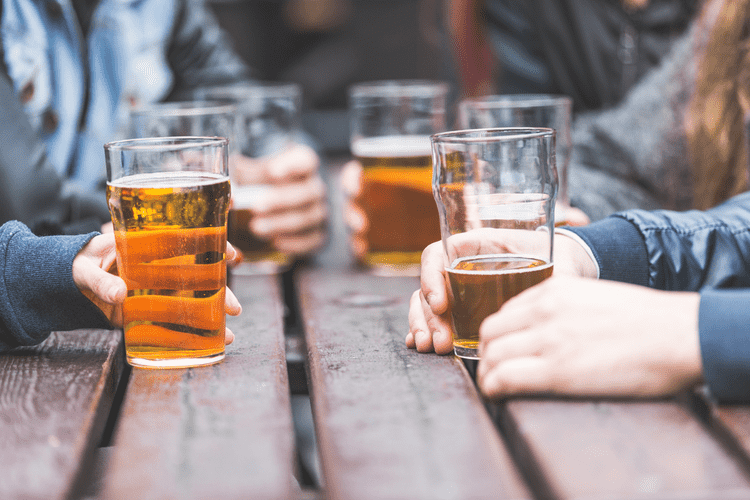Excessive drinking may also lead to an alcoholic blackout, a condition reached when the blood alcohol concentration (BAC) is over 0.16%. The reduced platelet count and stickiness of already circulating platelets prolong bleeding time from injuries, leading to visible bruises. This increased blood flow means more blood might escape the vessel if it ruptures. Over time, the damage done can lead to alcoholic neuropathy, where the peripheral nerves in your limbs have been badly damaged by alcohol. Alcohol is also a diuretic, meaning it dehydrates you every time you have a drink.
Are some individuals more susceptible to alcohol-related bruising?
This deficiency makes the blood less able to clot effectively, leading to easier bruising and prolonged bleeding. Liver dysfunction can make individuals more vulnerable to bruising, even without significant trauma. Some bleeding disorders can cause easy bruising, and those that seem speckled with purple splotches on a regular basis may think they are experiencing symptoms of a disorder like this. Those who bruise easily and don’t have a family history of a bleeding disorder are unlikely to have a bleeding disorder themselves.
Why You Bruise More Easily When You Drink Alcohol
Unexplained bruises and scrapes may be observed more frequently, and alcoholics can have reduced platelet counts and other clotting factors, making them do alcoholics bruise easily more likely to bruise. This is especially true when you consider the increased likelihood of them falling. This is called ‘alcohol flush reaction’ and it happens when your body is unable to fully digest all the alcohol you’ve consumed.
- This is because alcohol slows down central nervous system activity, increasing the time it takes to register stimuli and decide on a course of action.
- If you’re struggling to control your drinking or are worried about the health effects, reach out for professional help.
- If your bruise doesn’t improve within two weeks, or if you start to notice frequent, unexplained bruises—whether you’re drunk or sober—call your doctor.
- It’s helpful when people take pictures of bruises they’re concerned about and make a note of the trauma that caused it,” says Angelini.
Liver disease

Alcohol can lead to problems such as fatty liver, hepatitis and cirrhosis. This can develop into alcohol hepatitis, which is the inflammation of the liver. Alcohol can have a damaging effect on many aspects of our lives, even if we only consume it in small amounts. The type of alcohol consumed does not significantly affect the likelihood of bruising. Instead, the amount of alcohol consumed and its impact on the body’s clotting mechanisms play a more significant role in causing bruising.

When you bump into something, like your bed or couch, you may injure tiny blood vessels. You may avoid possible health problems by limiting your alcohol consumption. When it comes to drinking, remember to always prioritize your well-being and make appropriate decisions. Alcohol consumption without a good meal prior may result in headaches, dizziness, and nausea. To maintain a balanced lifestyle, it is advised to have a nutritious meal or snack before drinking alcohol to avoid any negative consequences. Consuming food while drinking alcohol may reduce the pace at which alcohol is absorbed into your circulation.
Bruises and injuries
- While bumping into something while drinking may seem relatively harmless, the truth is that excessive drinking can set you up for serious injuries from falling or other accidents.
- However, the person often can’t recall the events that happened during an alcoholic blackout, which can include bumps, falls, and accidents that may have caused bruises.
- As a result, you’ll enjoy better sleep, improved mood and energy, and fewer wellness issues.
- The liver plays a central role in the body’s clotting process by synthesizing proteins essential for blood coagulation, including factors like fibrinogen and prothrombin.
- At this point, drinking is no longer just a casual social activity — it’s become a daily habit that may be used to cope with stress, anxiety or other emotional problems.
This is because alcohol interferes with the normal clotting process, thinning the blood and reducing the ability of platelets to clump together effectively. So, let us discuss how to prevent bruising from Halfway house alcohol, such as drinking responsibly, keeping hydrated, eating before drinking, and a few more. While waking up with a few minor bruises after drinking may not be cause for concern, repeated or excessive bruising should be evaluated for an underlying disorder. Listen to your body and don’t assume all bruises related to alcohol are inevitable.
Mindful drinking offers that middle ground where you’ll proactively improve your drinking habits without any pressure to quit. It centers on being more conscious and thoughtful of how much, how often, and why you drink. As a result, you’ll enjoy better sleep, improved mood and energy, and fewer wellness issues. Alcohol addiction and heavy drinking can have detrimental effects on the body and can cause vitamin deficiencies, which may increase bruising. Alcohol would help one fall asleep sooner, but it does interrupt deeper stages of restorative sleep, especially REM. Poor sleep increases inflammation and diminishes immune function while impeding healing.
When to Seek Medical Advice for Bruising

Chronic heavy drinking can lead to liver damage, which is another contributing factor to easy bruising. However, excessive alcohol consumption can damage the sensitive cells lining the liver, impairing its function. When the liver is not functioning optimally, it affects the body’s ability to stop bleeding and heal wounds, resulting in increased bruising. Firstly, alcohol is a vasodilator, causing https://www.trinitysilomhotel.com/2022/11/02/quitting-alcohol-timeline-what-to-expect-in-weeks-2/ blood vessels to relax and expand, which increases blood flow throughout the body. This means that even minor bumps can cause blood vessels to burst more easily, resulting in bruises.




